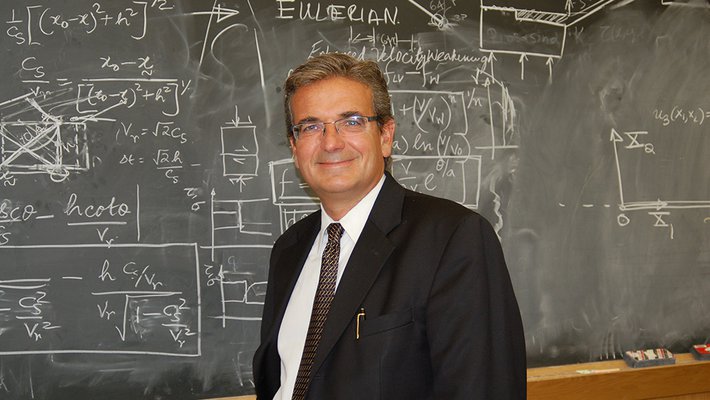Caltech’s Ares Rosakis Elected to Royal Society of Great Britain
Ares Rosakis, Caltech’s Theodore von Kármán Professor of Aeronautics and Mechanical Engineering, has been named a foreign member of the Royal Society, the United Kingdom’s national academy of sciences. Founded in 1660 under the patronage of King Charles II, the Royal Society is the oldest scientific academy in continuous existence. Rosakis is among 94 inductees to the society this year, including 22 new foreign members. His election brings to six the number of fellows and foreign members of the Royal Society currently on the Caltech faculty.
“I am pleased to welcome such an outstanding group into the Fellowship of the Royal Society,” said Sir Adrian Smith, president of the Royal Society, in a prepared statement. “This new cohort have already made significant contributions to our understanding of the world around us and continue to push the boundaries of possibility in academic research and industry. From visualising the sharp rise in global temperatures since the industrial revolution to leading the response to the Covid-19 pandemic, their diverse range of expertise is furthering human understanding and helping to address some of our greatest challenges.”
Rosakis is a highly interdisciplinary engineer known for inventing multiple high-speed diagnostic methods for studying failure phenomena at all length and timescales. His research interests range from the mechanics and physics of earthquake rupture processes to the physical processes involved in the catastrophic failure of aerospace materials to the reliability of microelectronic and optoelectronic structures and devices. In 1989, he was the first to observe the phenomenon of intersonic shear delamination in impact-loaded composites and bi-materials, and in 2000, he experimentally discovered the existence of supershear earthquake ruptures (in which the speed of the frictional rupture exceeds the velocity of seismic shear waves) with Hiroo Kanamori, the John E. and Hazel S. Smits Professor of Geophysics, Emeritus. He later pioneered the use of laboratory earthquakes and scaling to resolve paradoxes in earthquake science and to study supershear earthquakes worldwide, including the catastrophic magnitude-7.8 earthquake that struck Turkey and Syria on February 6, 2023.
Rosakis earned his bachelor’s degree from the University of Oxford in 1978 and his master’s and doctoral degrees from Brown University in 1980 and 1982, respectively. He joined the Caltech faculty as an assistant professor in 1982, became an associate professor in 1988, and a professor in 1993. He was named the von Kármán Professor in 2004 and served as the director of GALCIT from 2004 to 2009, chair of the Division of Engineering and Applied Science from 2009 to 2015, and as the Booth Leadership Chair from 2013 to 2015.
Rosakis has received numerous honors and awards throughout his career. He was elected to the National Academy of Sciences in 2016 and is also a member of the National Academy of Engineering, a fellow of the American Academy of Arts and Sciences, the historic Academy of Athens, the Indian National Academy of Engineering, and three European academies. He has also received the William M. Murray Lecture (2005) from the Society of Experimental Mechanics, the Eringen Medal (2011) from The Society of Engineering Science, the Theodore von Kármán Medal (2016) from the American Society of Civil Engineers, and the Timoshenko Medal (2018) of the American Society of Mechanical Engineers, the highest honors awarded by these societies. In 2012, he was named Commandeur dans l’Ordre des Palmes Académiques by the Republic of France, and in 2021, Brown University awarded him with the Horace Mann Medal, recognizing him as an outstanding alumnus.

